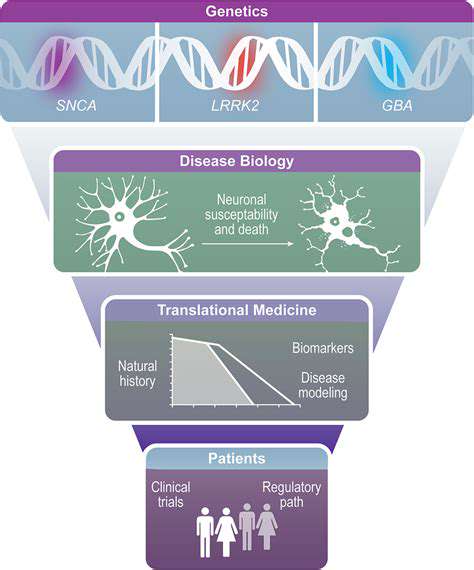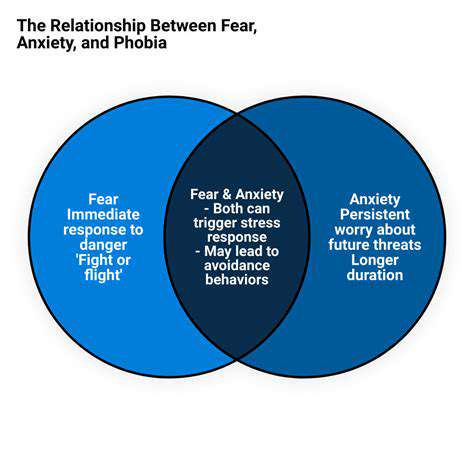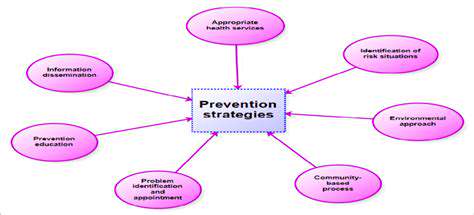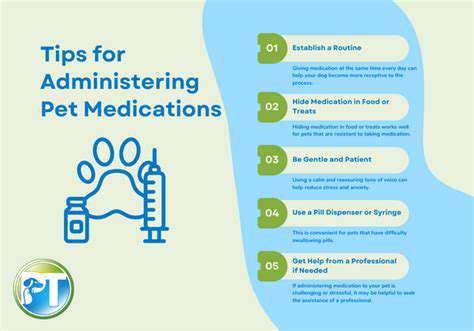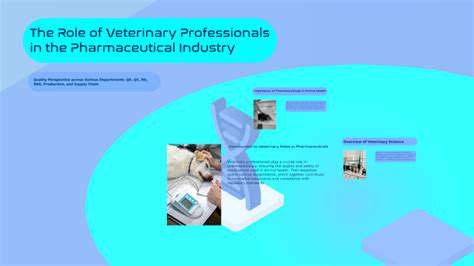The Future of Pet Healthcare: Innovations and Advances
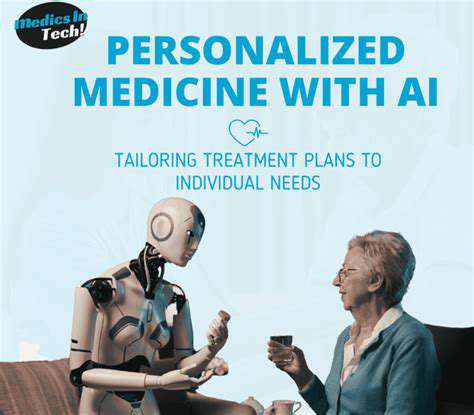
Personalized Medicine for Pets: Tailored Treatments
Personalized medicine, a rapidly evolving field in human healthcare, is now making its way into veterinary medicine. This approach recognizes that each animal, just like each human, possesses unique genetic predispositions and physiological variations. This understanding allows for the development of tailored treatment plans that address individual needs, rather than relying on a one-size-fits-all approach. This is particularly beneficial for managing chronic conditions and preventing future health issues.
By considering an animal's specific genetic makeup, environmental factors, and lifestyle, veterinarians can make more informed decisions about diagnoses and treatment strategies. This proactive approach can lead to better outcomes and a higher quality of life for pets.
Genetic Testing and Diagnostics
Genetic testing is playing a crucial role in personalized medicine for pets. These tests can identify specific genetic mutations or variations that might increase a pet's risk of developing certain diseases, such as cancer, hip dysplasia, or heart conditions. This information is invaluable for preventative care and early intervention.
Early detection of genetic predispositions allows for proactive measures, such as dietary adjustments, exercise regimes, and medication protocols, to mitigate the risk or slow the progression of these conditions. This proactive approach can significantly improve the pet's long-term health and well-being.
Pharmacogenomics: Medication Response
Pharmacogenomics is another key aspect of personalized medicine. This field studies how an animal's genetic makeup influences their response to medications. By understanding these genetic variations, veterinarians can select the most appropriate medications and dosages, minimizing adverse effects and maximizing effectiveness. This precision approach is crucial for ensuring optimal treatment outcomes.
Nutrition and Dietary Needs
Personalized nutrition plays a significant role in promoting optimal health and well-being for pets. Understanding the specific dietary needs of an animal, based on its breed, age, activity level, and genetic predispositions, can greatly influence its health and prevent or manage various conditions. This tailored approach allows for the creation of a diet that supports the animal's specific needs, promoting overall health and well-being.
Identifying and addressing nutritional deficiencies early on can prevent a range of health issues, from weight problems to digestive disorders. It also allows for the identification of potential allergies or intolerances, further customizing the animal's dietary plan. This precision approach to nutrition can lead to improved digestion, weight management, and overall health.
Monitoring and Long-Term Management
Personalized medicine extends beyond initial diagnosis and treatment. It emphasizes continuous monitoring and long-term management. Regular assessments, including blood tests, genetic screenings, and physical examinations, can help track progress and adjust treatment plans as needed. This ongoing support ensures that the animal's health is proactively managed throughout its life.
Using data collected over time, veterinarians can refine their approach to treatment, ensuring the best possible outcomes for the animal. This comprehensive, ongoing approach to care ensures that the pet receives the most appropriate and effective treatment throughout its life, optimizing its health and well-being. This type of proactive approach is critical for maintaining the long-term health of pets.
The Role of Data Analytics and AI in Veterinary Practices: Enhancing Efficiency and Accuracy
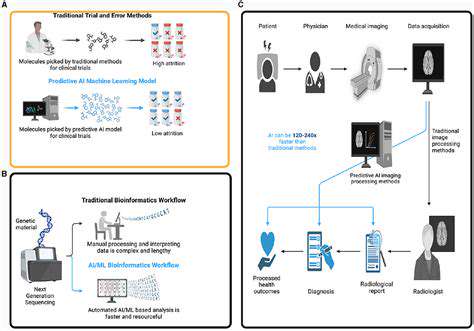
Data-Driven Decision Making
Data analytics plays a pivotal role in modern business operations, enabling companies to make informed decisions based on verifiable data, rather than relying on intuition or guesswork. By analyzing vast quantities of data from various sources, businesses can identify trends, patterns, and insights that would otherwise remain hidden. This data-driven approach fosters a culture of accountability and transparency, leading to more effective strategies and improved outcomes.
Data analytics empowers businesses to understand their customers better, leading to more targeted marketing campaigns and personalized experiences. This deeper understanding of customer behavior and preferences allows companies to tailor products and services to meet specific needs, fostering stronger relationships and driving loyalty.
Predictive Modeling and Forecasting
Predictive modeling, a powerful application of data analytics, allows businesses to anticipate future trends and outcomes. By identifying patterns and relationships within historical data, algorithms can predict future events, such as market fluctuations, customer behavior, and equipment failures. This foresight enables proactive measures, allowing companies to adjust strategies in advance to capitalize on opportunities and mitigate potential risks.
Forecasting future demand is crucial for optimizing inventory management, resource allocation, and production planning. Accurate forecasts minimize waste, reduce costs, and ensure optimal resource utilization, ultimately boosting profitability and efficiency.
AI-Powered Automation
Artificial intelligence (AI) is transforming various industries by automating tasks previously handled by humans. AI-powered systems can process large volumes of data quickly and accurately, identifying patterns and insights that might take human analysts days or weeks to uncover. This automation frees up human resources, allowing them to focus on more strategic and creative tasks.
AI's ability to automate tasks significantly boosts operational efficiency and reduces the risk of human error. This translates to improved accuracy, faster processing times, and ultimately, higher productivity levels.
Improved Customer Experience
Data analytics and AI are instrumental in enhancing the customer experience. By analyzing customer data, companies can gain valuable insights into customer preferences, pain points, and needs. This knowledge allows them to personalize interactions, tailor offerings, and resolve issues proactively, ultimately driving customer satisfaction and loyalty.
Personalized recommendations and targeted marketing campaigns, powered by AI, create more engaging experiences for customers. This personalized touch fosters stronger relationships, increases customer lifetime value, and builds brand loyalty.
Enhanced Security and Fraud Detection
Data analytics and AI play a crucial role in enhancing security and detecting fraud. By analyzing large datasets, these technologies can identify anomalies and suspicious patterns that might indicate fraudulent activities. This proactive approach enables businesses to prevent financial losses and maintain data integrity.
Advanced algorithms can detect patterns and anomalies in transactions, enabling early detection of potentially fraudulent activities. This early detection minimizes financial losses and protects sensitive data, safeguarding both the organization and its customers.
Optimization of Business Processes
Data analytics and AI can optimize various business processes, from supply chain management to marketing campaigns. By identifying bottlenecks and inefficiencies within these processes, companies can implement targeted solutions to improve efficiency and productivity. This optimization can lead to significant cost savings and improved performance.
Optimizing processes using data-driven insights enables businesses to streamline operations, reduce waste, and increase overall profitability. This targeted approach to process improvement is crucial for maintaining a competitive edge in today's dynamic market.
Read more about The Future of Pet Healthcare: Innovations and Advances
Hot Recommendations
- Customized Sleep Schedules: AI Driven for Sustainable Rest
- Crafting a Personalized Productivity Plan for Mental Clarity
- Sustainable Self Compassion: Cultivating Kindness Towards Your Mind
- Sustainable Productivity Hacks for the Busy Professional
- Sustainable Wellness for Parents: Balancing Family and Self Care
- Data Informed Self Care: Designing Your Personalized Wellness Strategy
- Sustainable Wellness for a Purpose Driven Life
- AI Assisted Mindfulness: Personalized Meditations for Deeper Practice
- Building Inclusive Mental Health Services: Key Initiatives
- AI Powered Self Care: Customizing Your Routine for Maximum Impact

